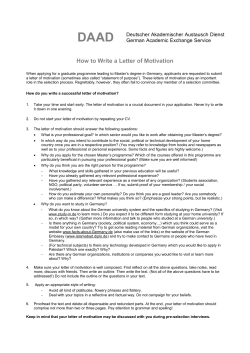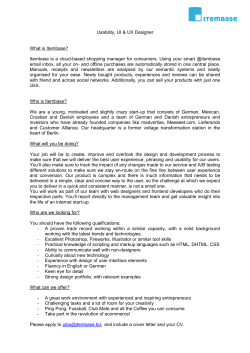
Document 349707
Department of Modern and Classical Languages Intensive German Language Study Berlin, Jan. 2-‐18, 2015 Center for Global Education Center for Global Education Faculty Director Christiane Armstrong, M.A. Modern & Classical Languages Department MCL 3E5 Aquia Building 374 George Mason University 4400 University Drive Fairfax VA 22030 email: carmst14@gmu.edu Schedule Monday: 09:45 -‐ 13:00 Tuesday to Friday: 08:30 -‐ 13:00, plus mandatory excursions. Room: Carl Duisberg Training Center, Berlin, Germany Instructors All Levels: Local Professors and some presentations by Mason director. Two-‐Week Session: 2 – 18 January 2015 (3 credits) at the Carl Duisberg Training Center [Arrival in Germany: January 2, 2015 -‐ Departure from Germany: January 18, 2015 Airports: Frankfurt, Berlin Tegel, Munich] Credit Offering • • • • • • • • Elementary German I GERM 101 (3 credits) Elementary German II GERM 102 (3 credits) Intermediate German GERM 210 (3 credits) Gateway to Advanced German GERM 250 (3 credits) Conversation and Composition GERM 310 (3 credits) German for the Business World GERM 316 (3 credits) Advanced Grammar and Style GERM 415 (3 credits) Advanced Composition GERM 418 (3credits) Program Description This program is open to all undergraduate students with a min. cumulative GPA of 2.25, including students who do not attend George Mason University. The objective of this program is to provide students with an authentic German immersion experience including language instruction, stay with host families, some presentations on local history and culture, and local visits with a bilingual guide. For more information visit: http://globaled.gmu.edu/programs/facultyled/winterstudy/germany.html This new program will take you to the vibrant city of Cologne on the Rhine in North Rhine-‐Westphalia, a German state bordering the Netherlands and Belgium. Cologne is one of the largest cities in Germany and a cultural and commercial hub for Western Germany. Course Description Language instruction: The Carl Duisberg Course system is based on the Common European Framework of Reference for Languages. The six language levels from A1 to C2 are offered at the Carl Duisberg Training Center in Cologne. A placement test before the start of the course determines your previous language level. You will then be grouped into the appropriate course level. Please note that Mason students may be grouped with other students from the European Union, upon consultation with the Academic Director. Classes focus on effective oral and written communication with more emphasis on Listening and Speaking activities. Pair work and group work will be strongly encouraged. You are welcome to propose some subjects, materials or specific grammatical points you wish to cover in class. Several opportunities for out of class practice will be offered, through afternoon presentations, local visits and interaction with the family hosts. Course work, including targeted lecture series and some guided exercises, meet the 45 contact hour requirement. If you are facing difficulties with the material covered, you welcome to request tutoring from Prof. Christiane Armstrong. Mason Course Descriptions • • • • • • • • GERM 101 -‐ Elementary German I. Credits: 3 (NR) Designed for students with no knowledge of German. Introduces elements of grammar, vocabulary, oral skills, listening comprehension, and reading. GERM 102 -‐ Elementary German II. Credits: 3 (NR) Continuation of GERM 101. GERM 210 -‐ Intermediate German. Credits: 3 (NR) Continuation of the development of basic components of the language, with focus on listening, speaking, reading, and writing skills. Introduces students to the cultures and histories of German speaking regions. GERM 250 -‐ Gateway to Advanced German. Credits: 3 (NR) Integration of advanced intermediate-‐level German reading, writing, listening, and speaking skills, and the development of critical thinking about authentic texts from around the globe. GERM 310 -‐ Conversation and Composition. Credits: 3 (NR) Develops fluency in speaking and proficiency in writing German through discussion, reports, and compositions based on texts dealing with contemporary events and issues. GERM 316 -‐ German for the Business World. Credits: 3 (NR) Introduces terminology and structural features of business German. Emphasizes acquiring vocabulary and developing facility in reading German business articles and correspondence. GERM 415 -‐ Advanced Grammar and Style. Credits: 3 (NR) Studies syntax, idiomatic features, and levels of style. Extensive practice in different types of written expression. GERM 418 -‐ Advanced Composition. Credits: 3 (NR) Develops proficiency in writing German through intensive practice in preparing guided and original compositions. Classes meet as follows: Monday: 09:45 -‐ 13:00 Tuesday to Friday: 08:30 -‐ 13:00. Class preparation will vary, but you should count on at least 2 hours per day per class of outside preparation. The Faculty Director has lived, studied and traveled in Germany for extended periods of time. From 2008 – 2012 Ms. Armstrong lived and worked in Berlin. She is extremely knowledgeable about the city and will be available daily on location to help with any administrative, cultural, or personal problems that may arise. All students will reside with a host family for the duration of the two-‐ week program. Instruction is provided by the Carl Duisberg Training Center staff and/or Prof. Armstrong. The Faculty Director works in concert with the instructors to prepare the class materials and activities. The director will determine and submit the final grade. There will be 45 teaching units covered, each 45 minutes in length, which are supplemented by cultural activities, such as the planned visits to the German Parliament (Reichstag), Television Tower (Fernsehturm), Museum Island, Berlin Wall Memorial, East-‐Side Gallery, Berlin Jewish Museum, the “Brecht-‐Theater” (Berliner Ensemble) as well as optional day trips on the weekends to Dresden and Leipzig. The methodology adopted by the Carl Duisberg’s qualified and experienced teachers is interactive and dynamic using innovative technologies. Courses are structured around the four fundamental competencies: oral comprehension, written comprehension, oral production, and written production. All course materials are included, as well as a starter pack. Language learning will be reinforced by the homestays arranged for the participants. Learning Objectives This course will help you • • • • • Learn and practice all 4 skills (reading, writing, listening, and speaking) in a full immersion program. Experience first-‐hand life in Germany. Explore German traditions (social customs, cuisine, music, art). Interact with various local officials and merchants through interviews and planned visits. Discover local destinations through guided excursions. Honor Code You are to follow the provisions of the Mason Honor Code for all work submitted for a grade. As a consequence, any student cheating, aiding in cheating, or plagiarizing will automatically receive a failing grade for the assignment or the class, and may be subject to further disciplinary action. Please note that you are expected to write all compositions on your own and you should not have them reviewed or corrected by another student or a more advanced speaker of German. If you work on class materials with a tutor, you should inform your instructor in advance. Any exceptions (e.g., peer review activities) will be explicitly announced by your instructor. For further information please refer to the Mason Honor Code website. Course Requirements and Grading Policy All students are required to attend the pre-‐departure orientation and discussion sessions in Fairfax. While in Germany, students are required to: • • • • • • • • • • • • • attend all scheduled classes attend all organized excursions attend two dinners do all assigned homework, take all exams, and participate actively in the program. For 100-‐200 level courses: Class and program participation = 50% Portfolio (homework, quizzes) = 30% Oral/Final (presentations, interviews, progress) = 20% For 300-‐400 level courses: Class and program participation = 30% Portfolio (homework, quizzes) = 30% Oral/Final (presentations, interviews, progress) = 20% Written composition = 20% The final grade will be determined in relation to the Mason class level for which a student is registered. The grading scale in Germany differs greatly from the one used in the United States. The Faculty Director will compute all German grades into American grades. Grades will be assigned based on the chart below, which follows University regulations: 90-‐100% 80-‐90% 65-‐80% 1+ 15 points 1 14 points 1-‐ 13 1.3 points 2+ 12 1.7 points 2 11 2.0 "gut" (good: an achievement substantially above average requirements) points 2-‐ 10 2.3 points 3+ 9 2.7 points B+ 3 8 "befriedigend" (satisfactory: an achievement which corresponds to average 3.0 points requirements) B 3-‐ 7 3.3 points B-‐ 4+ 50-‐65% 4 0-‐50% 1.0 A+ "sehr gut" (very good: an outstanding achievement) A 6 3.7 points "ausreichend" (sufficient: an achievement which barely meets the requirements) 5 4.0 points C 4 points C-‐ 5+ 3 points D 5 2 "mangelhaft" / "ungenügend" / "nicht bestanden" (not sufficient / failed: an 5.0 points achievement which does not meet the requirements) 6 C+ 4-‐ 1 5-‐ point A-‐ 0 points D/F F General Course Expectations Class preparation work: learning German requires individual study in addition to the exposure to and participation in communicative activities. Students are required to study assigned materials and complete the assigned exercises, attend class regularly and participate actively in all study tour activities. Instructions for class preparation for each day will be given by the instructor during the previous session. Recommended preparation prior to departure It is well known that students who prepare in advance get far more out of their study abroad experience. You are highly encouraged to visit various websites with information on Germany and documents on Cologne. Prior to departure. A list of such documents, along with a list of movies available on Netflix or the library will be provided during the November orientation session. The Faculty Director will periodically discuss this foundation work with students and results of the discussions will be taken into account for the final grades. Accommodation Lodging: guest house or host family arrangement. Daily breakfast will be provided. Lunch is not included, however, there are numerous inexpensive lunch locations in the vicinity of the Center. The distance to the Center can vary from 5 minutes by foot or 20 minutes by bus/tram – tickets are included. Students are expected to comply with the Carl Duisberg rules of conduct in addition to the Mason and Center for Global Education ones. Please see the Student Handbook for more details. Excursions Berlin City Tour (by bus or boat), the German Parliament (Reichstag), Television Tower (Fernsehturm), Museum Island, Berlin Wall Memorial, East-‐Side Gallery, Berlin Jewish Museum, the “Brecht-‐Theater” (Berliner Ensemble) as well as optional day trips on the weekends to Dresden and Leipzig. Students will have some free time on weekends, during which they may explore any of the local or regional destinations. Faculty Director Christiane Armstrong The Faculty Director is responsible for communicating rules and expectations regarding academics, behavior, and group interaction to participants. The program was organized by Achim Loch from the Center for Global Education. The faculty director will be responsible of all aspects of the program, including arranging site visits, insuring academic rigor and addressing concerns with instruction. She is available to the students for academic and personal support and is on-‐call 24 hours a day. You will have her address in Berlin, as well as her mobile phone number prior to departure. Have a wonderful time in Berlin!
© Copyright 2025










